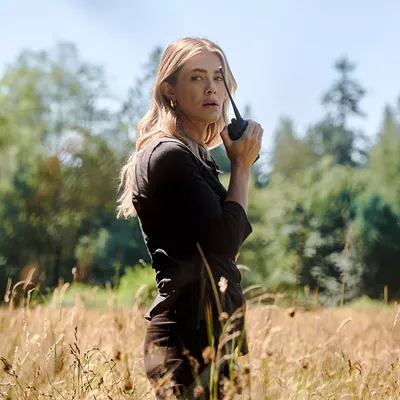So embedded in our common culture is Shakespeare's Romeo and Juliet that you might feel like you've seen it even if you've never witnessed a full production. It's one of those rare works that folks can often quote—"O Romeo, Romeo, wherefore art thou Romeo?"— despite knowing little more than a basic plot outline.
Gonzaga's new production of Romeo ∞ Juliet intends to challenge some of those assumptions. Right down to the stylized infinity symbol in its title (still read as "and"), it's designed to have audiences reassess what they think they already know about this tragic romance.
"I want to make people stop a moment and have that question," says director Charlie Pepiton, Gonzaga's Theatre and Dance Department chair.
To do so, he's adapted Shakespeare's original text in a way that shuffles the chronology and shifts the customary emphasis of the play.
"It's a structural deviation," he says. "Everything the audience hears is straight from the original ... but the significant change is that it's about a hundred minutes, starting with the tombs and then triangulating through the play to try to find the moment where Juliet makes her choice that changes everything."
The specific choice he's talking about is Juliet's decision to marry Romeo during the play's famous balcony scene when Romeo, a Montague, comes to woo Juliet, a rival Capulet, after seeing her at a ball earlier that night.
"This play is almost always done with this idea of love at first sight, and I think there's more than that going on. Love at first sight removes choice from the picture. What I'm trying to do with this recutting, this restructuring, is to highlight that the power of that moment really sits with Juliet. She chooses to propose marriage to him. And the choice that I'm really interested in is the choice that she makes to devote herself to Romeo."
Much like the late literary critic Harold Bloom, Pepiton roots this pivotal point in just a few key lines:
"And yet I wish but for the thing I have./ My bounty is as boundless as the sea,/ My love as deep. The more I give to thee,/ The more I have, for both are infinite."
Anna Kay, a sophomore at Gonzaga, is playing Juliet opposite Brett Bean as Romeo.
"The way Charlie and I have been working to interpret this character together makes her a much stronger, more decisive character and much more in control of this relationship that she has with Romeo," Kay says.
That self-assurance is something that Kay felt was missing from Juliet's character. And she suspects the common perception of Juliet as a delicate flower could also be a sticking point for contemporary audiences.
"When I read Romeo and Juliet for the first time in high school, one of the things that put me off was the fact that she seems kind of helpless or just drawn along in this storyline. Our interpretation is all about her decision to love Romeo ... and how that choice to love inevitably kills both of them but also heals this fighting between their families."
All this focus on choice might seem like it's diminishing some of the romance. Both Pepiton and Kay say that passion still features heavily in this restructured version, which actually opens with the lovers' tragic, emotionally charged end in the Capulet tombs.
"It's not quite as clinical, and I think that Juliet doesn't choose initially to love Romeo," she says. "You still do see some of that love-at-first-sight, very instant connection, that chemistry. But what she chooses is to continue to love him, to choose his love above all other things."
And while the play will also retain some of its historical grounding in 16th century Verona through Leslie Stamoolis' costuming, there are deliberate modern flourishes. The set by Courtney Smith is designed to resemble a Möbius strip, mirroring Juliet's declaration of infinite love. Local artist Darrien Mack, appearing as DJ Rosethrow, will be mixing diegetic and inter-scene music in real time by incorporating the soundtracks to popular era-defining Romeo and Juliet revivals like Franco Zeffirelli's (1968) and Baz Luhrmann's (1996).
"One of the questions that started this was, how can we unpack the play from what we know of it? We're playing with that purposeful anachronism," Pepiton says.
"Audiences can expect an opportunity to see the play with new eyes. Romeo and Juliet is for good reason the greatest love story that we have. This production is about trying to give us a new way to encounter that story." ♦
Romeo ∞ Juliet • Nov. 1-10; Fri-Sat at 7:30 pm, Sun at 2 pm • $20 • Myrtle Woldson Performing Arts Center • 211 E. Desmet Ave • gonzaga.edu/mwpac • 313-2787




















